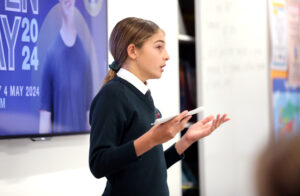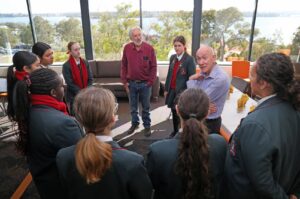Lee-Elle’s Insights from the ‘Make it 16’ Forum

Lee-Elle Cooper is a passionate Year 12 student who advocates for youth engagement and political participation. In this article, we interview her about her experience attending the ‘Make it 16’ Forum in Canberra and explore the insights she gained from this empowering experience.
How did you come to attend the ‘Make it 16’ Forum?
I have been involved with the Make It 16 campaign since July of last year, so when the opportunity came up to travel to Canberra for a campaign-building and training camp, I was excited for the opportunity to grow my skills and meet new people. We attended media training workshops and met with several Members of Parliament. I also learned more about the history of voting rights in Australia and how to grow our campaign.
How did it feel to represent Western Australia at the 'Make it 16' forum in Canberra? What stood out as the most memorable aspect of the experience for you?
I felt very lucky to be able to represent WA at the Make it 16 Forum. I loved meeting other young people from across Australia, as well as the staff from the Foundation for Young Australians who helped to organise the event for us. The most memorable experience for me was making lifelong friendships with people from across Australia, as well as meeting several grassroots community organisers.
Meeting with politicians must have been exciting. Can you share any interesting conversations or insights you gained from interacting with them?
It was extremely exciting to be able to meet with politicians from across the political spectrum, especially Alicia Payne, the member for Canberra and Peter Cain, the ACT shadow Attorney General. Alicia and Peter were amazing to speak with, and both loved how passionate and politically engaged we were. It was also exciting to see how genuinely open everyone we met with was to listening to young people’s thoughts and ideas.
What motivated you to become involved in advocating for lowering the voting age to 16? How do you believe this change could positively impact young people and society as a whole?
I was motivated to get involved with the Make It 16 campaign when I began campaigning for the Voice to Parliament referendum last year. I volunteered almost every weekend for months leading up to the referendum, but on the day, I was not allowed to vote. I was even offered the opportunity to act as a scrutineer and count other people’s votes when the ballots were being checked- despite not even being able to cast a vote myself.
I believe that if someone is old enough to work, pay income tax, enrol in the defence force and leave high school, they should be allowed to vote. Extending the right to vote to 16 and 17 year olds would also incentivise the government to strengthen civics education, so that young people are taught how to understand our political system, and how to vote, before they leave school.

In what ways do you think youth voices can be better heard and represented in political decision-making processes? Did the forum offer any strategies or solutions in this regard?
By extending the right to vote to 16 and 17 year olds, politicians will be forced to listen to our issues and concerns. The policies that are being debated in Parliament today will be defining issues for my generation, and if our voices counted as votes, politicians would be much more likely to act on our concerns.
Many countries that have given 16 and 17-year-olds the right to vote, including Scotland, Wales, Austria and Brazil, have reported an increase in their younger generations’ trust in government, and this can be directly correlated to people’s understanding and involvement in their political system from a younger age.
You've had work experience in Member for Fremantle's office and are part of the Ethics Centre Youth Committee. Tell us a bit about this and how these experiences have shaped your views on politics and community engagement?
Over the Christmas school holidays I had the opportunity to help out Josh Wilson’s office, the Member for Fremantle. I responded to constituent’s emails, researched electorate issues, and organised welcome letters for new residents to the area. I am also a member of the Ethics Centre’s Youth Advisory Council, based in Sydney. Twice a year, I fly to Sydney to meet with the Youth Advisory Council, where we advise the Ethics Centre on how they can better engage with young people in the community though the various events and functions that they organise. These opportunities have allowed me to explore my passions in advocacy and raising awareness of issues and have also been valuable experiences to help me to discover careers I would be interested in pursuing after finishing school.
What advice would you give to other students who are passionate about making a difference in their communities but may not know where to start?
I would advise anyone wanting to make a difference in their community to reach out to any local organisations that focus on issues you are passionate about. Most community organisations are always after new people to help them out, and it is extremely valuable to make connections with people in your local community if you want to make a real difference. Also, the ‘Make it 16’ campaign is a great opportunity for young people who want to strengthen our democracy and make some great friends along the way!
Do you know what you plan to do after Year 12 or have an idea of the career path you’d like to pursue?
Next year, I plan to study law at Murdoch or UWA. After university, I would love to work for an organisation such as the Aboriginal Legal Service or a community legal centre.
It is evident that youth voices like Lee-Elle are crucial for shaping our society’s future. Through initiatives like the ‘Make it 16’ campaign and active engagement in community affairs, young leaders like Lee-Elle are making significant strides towards a more inclusive and participatory democracy. Let’s continue to support and amplify the voices of our youth, ensuring they have a seat at the table where decisions about their future are made.

The Value of Student Voice – Jennifer Oaten
“At Santa Maria College, we are not only given the opportunity, but we are encouraged by our teachers and each other to voice our opinions, concerns and ideas—to continue moving forward as a school and as a community. Student voice is integral for growth, and allows for us, as students to have an active role in shaping our education.”

Shining a Spotlight on Our Student Ministry Team
This week, we shine a light on a dynamic group of students – our Ministry team, who are doing wonderful things in the Faith space.

Weekly Wrap Up: Term 2, Week 3, 2024
This Weekly Wrap Up is brimming with activity including the Freeze Frame Opera, the Sisterhood Series and Year 9 French.
- Confidence, Featured, Initiative, Learning for Life
Author: Santa Maria College
Santa Maria College is a vibrant girls school with a growing local presence and reputation. Our Mission is to educate young Mercy women who act with courage and compassion to enrich our world. Santa Maria College is located in Attadale in Western Australia, 16 km from the Perth CBD. We offer a Catholic education for girls in Years 5 – 12 and have 1300 students, including 152 boarders.






